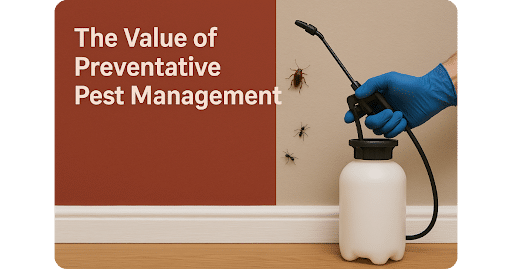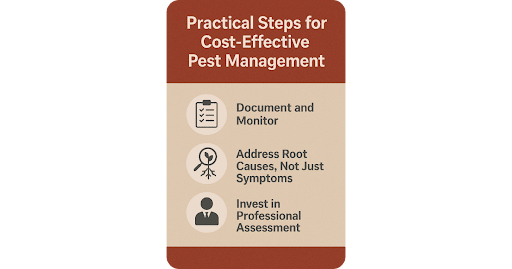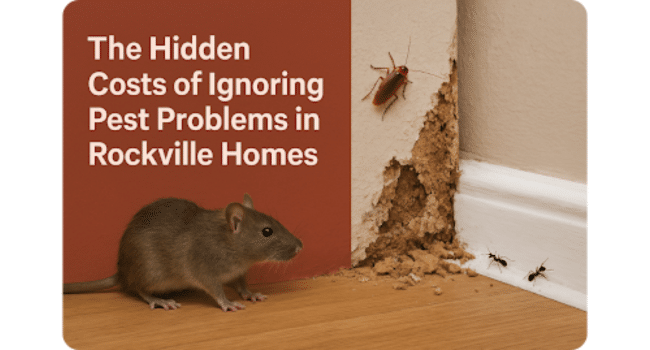Table of Contents
As Rockville homeowners prepare for changing seasons, many overlook one crucial aspect of home maintenance that can lead to significant expenses and headaches: comprehensive pest management.
While most residents recognize the immediate discomfort of encountering insects or rodents indoors, few understand the long-term financial implications of delaying proper pest control measures.
This article explores the surprising economic impact of pest infestations and why proactive investment in pest management makes financial sense for Rockville residents.
The Financial Reality Behind Pest Damage in Rockville Properties
The Montgomery County region, including Rockville, experiences a unique combination of urban and suburban pest pressures.
What begins as a minor annoyance—a few ants in the kitchen or occasional mouse droppings—can quickly escalate into costly structural damage or health hazards requiring extensive remediation.
When dealing with pests around Rockville, homeowners should consider these potential financial impacts that often go unnoticed until significant damage occurs:
Structural Damage: The Silent Home Destroyer
Termites represent perhaps the most financially devastating pests in the Rockville area, causing an estimated $5 billion in property damage annually across the United States.
Wood-destroying insects don’t limit themselves to just termites:
- Carpenter ants excavate wood to build their colonies, weakening structural supports
- Powderpost beetles can turn wooden beams into a fine powder-like substance
- Wood-boring beetles create tunnels throughout wooden structures
The average repair cost for termite damage alone ranges from $3,000 to over $8,000, with severe cases requiring substantially more investment.
Electrical System Risks: More Than Just Inconvenient
Rodents, particularly mice and rats common to the Rockville area, have an instinctual need to gnaw constantly.
Their targets often include electrical wiring, creating fire hazards throughout your home.
The National Fire Protection Association attributes nearly 20% of all “fires of unknown origin” to rodent damage to electrical systems.
The financial impact extends beyond repair costs:
- Electrical system repairs averaging $200-$1,200
- Potential home insurance premium increases following electrical fires
- Temporary displacement costs if significant repairs are needed
- Lost work time dealing with emergency situations
Health-Related Costs: The Invisible Expense
Beyond property damage, pests carry various health implications that can affect your family’s well-being and financial stability:
Medical Expenses and Lost Productivity
Cockroaches and rodents are known asthma and allergy triggers, particularly affecting children.
The National Institute of Environmental Health Sciences reports that cockroach allergens worsen asthma symptoms in 60% of urban residents with asthma.
Consider these potential medical expenses:
- Increased medication costs for respiratory conditions
- Doctor and specialist visits
- Emergency room trips for severe reactions
- Lost work days due to illness
- Reduced productivity while working through symptoms
Tick-borne illnesses, including Lyme disease, represent another significant health concern for Rockville residents enjoying outdoor activities.
The CDC estimates that Lyme disease diagnosis and treatment costs approximately $1,200 per patient on average, with long-term complications substantially increasing these costs.
Vector-Borne Disease Risks in Rockville
Mosquitoes in the Rockville area can transmit various diseases, including West Nile Virus.
While less common than everyday pest annoyances, these vector-borne illnesses carry substantial medical costs and potential long-term health impacts that far outweigh preventive treatment expenses.
The Value of Preventative Pest Management

Studies consistently show that preventive pest management costs significantly less than reactive treatments after infestations establish themselves.
When evaluating the true cost of dealing with pests around Rockville, consider these comparative figures:
- Average quarterly preventive pest service: $100-150 per treatment
- One-time rodent exclusion and cleanup: $300-$600
- Termite treatment for the established colony: $1,500-$3,000
- Comprehensive bed bug elimination: $1,200-$2,500
- Structural repairs from unaddressed termite damage: $3,000-$8,000+
Property Value Impact: The Real Estate Perspective
Real estate professionals consistently identify pest history as a significant factor affecting property values and marketability.
When selling a home in Rockville:
- Properties with documentation of regular pest management typically maintain higher appraisal values
- Disclosure of past infestations may lead to lower offers or extended time on market
- FHA and VA loans require clear termite inspections before approval
- Buyers often negotiate substantial discounts when evidence of pest damage is discovered
Real estate transactions can become complicated when pest issues arise during inspections.
Maintaining documentation of regular professional pest management can simplify the selling process and protect your investment.
Smart Pest Management: A Different Approach for Rockville Homes
Rather than viewing pest control as merely an optional service, consider reframing it as essential home maintenance—similar to HVAC servicing or roof inspections.
Comprehensive Assessment and Customized Solutions
The most effective approach to dealing with pests around Rockville begins with understanding your property’s specific risk factors:
- Property Age and Construction: Older Rockville homes often have more entry points and harborage areas for pests
- Landscape Characteristics: Properties with mature trees, dense vegetation, or water features face increased pest pressure
- Neighboring Properties: Untreated pest problems nearby can impact your home regardless of your own preventive measures
- Seasonal Factors: Rockville’s climate creates predictable pest pressure patterns that require seasonal adjustments
Practical Steps for Cost-Effective Pest Management

For Rockville homeowners looking to protect their property investment through effective pest management, consider these practical strategies:
1. Document and Monitor
Create a simple pest monitoring system:
- Maintain a log of any pest sightings, including date, location, and species if known
- Place monitoring stations in vulnerable areas like basements, attics, and utility rooms
- Conduct quarterly personal inspections of your property’s perimeter
- Take dated photographs of any damage or concerning areas
2. Address Root Causes, Not Just Symptoms
The most financially prudent approach focuses on eliminating conditions that attract pests:
- Repair plumbing leaks promptly
- Ensure proper drainage around foundations
- Maintain clean gutters and downspouts
- Store firewood away from structures
- Trim vegetation away from your home’s exterior
- Fix gaps around windows, doors, and utility entrances
3. Invest in Professional Assessment
Even if you handle some aspects of pest management yourself, periodic professional inspection provides:
- Expert identification of emerging issues before they become costly
- Documentation of property condition for insurance and real estate purposes
- Access to professional-grade preventive treatments
- Updated information about new pest threats in the Rockville area
Many Rockville pest management companies offer free or reduced-cost inspections, making this a low-risk investment in property protection.
